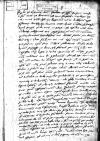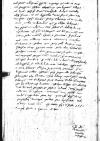List #482
Jan Benedyktowicz SOLFA do Ioannes DANTISCUSCracow (Kraków), 1530-04-18
Rękopiśmienne podstawy źródłowe:
Pomocnicze podstawy źródłowe:
Publikacje:
| ||||||||||
Tekst + aparat krytyczny + komentarz Zwykły tekst Tekst + komentarz Tekst + aparat krytyczny Ekscerpty dotyczące podróży Dantyszka
 AAWO, AB, D. 6, f. 1 unnumbered after f. 1
AAWO, AB, D. 6, f. 1 unnumbered after f. 1
Magnifico et eximio domino
Reverende et eximie domine, fautor et confrater carissime.
Accepi a  AAWO, AB, D. 6, f. 1v tuam sortem adverso animo perfert cupitque et tibi et tuis omnia prospera, praeter hoc celerem ex ista legatione reditum ad tuos, ips{a}e quoque saxum Tanthali diebus et noctibus absque fructu et cum dispendio vitae suae et sanitatis versat. Episcopus Cracoviensis Petrus Thomicius iam a medio anno mala valetudine et periculosa laborat: vir profecto, cui caelum immutari fas est; dolendum de eius infelicitate, sed commune est adagium: non bene conveniunt nec in una sede morantur opes et sanitas. Infelices nos, iam in dies novis atterimur morbis. Sudatoria enim febris, quae prius soli Britanniae ante quadraginta annos cognita erat, praeterito anno urbes omnes Balthici maris, dein Germanos sensim invasit, etiam Augustam. Scripsi in eum morbum, quo et Mauritius noster episcopus decubuit, sed nondum edidi in lucem. Scripsi prioribus, ab Hyspanis si nonnihil de arte cabalista comperires, et mihi communicares. Magia per Germaniam practicatur: quam et Hyspanos callere asserunt, quoniam papa ille Alemannus, praedecessor istius Clementis, magnam librorum copiam secum attulit Rhomam, ut Enkeford(?), suus datarius, rettulit. Curiositas ista licet non admodum laudanda, s hoc tamen tempore non abicienda. Verum tu vale faustiter et festina ad nos. Utinam possem multa tui causa efficere, cerneres me profecto non tardum in expeditione sortis tuae. Quam tibi(?) dominus Deus faustissimam deinceps concedat sua benignitate. Vale et vive ms. ae(!)
⌈ee ms. ae(!)
⌉ memor nostri.
AAWO, AB, D. 6, f. 1v tuam sortem adverso animo perfert cupitque et tibi et tuis omnia prospera, praeter hoc celerem ex ista legatione reditum ad tuos, ips{a}e quoque saxum Tanthali diebus et noctibus absque fructu et cum dispendio vitae suae et sanitatis versat. Episcopus Cracoviensis Petrus Thomicius iam a medio anno mala valetudine et periculosa laborat: vir profecto, cui caelum immutari fas est; dolendum de eius infelicitate, sed commune est adagium: non bene conveniunt nec in una sede morantur opes et sanitas. Infelices nos, iam in dies novis atterimur morbis. Sudatoria enim febris, quae prius soli Britanniae ante quadraginta annos cognita erat, praeterito anno urbes omnes Balthici maris, dein Germanos sensim invasit, etiam Augustam. Scripsi in eum morbum, quo et Mauritius noster episcopus decubuit, sed nondum edidi in lucem. Scripsi prioribus, ab Hyspanis si nonnihil de arte cabalista comperires, et mihi communicares. Magia per Germaniam practicatur: quam et Hyspanos callere asserunt, quoniam papa ille Alemannus, praedecessor istius Clementis, magnam librorum copiam secum attulit Rhomam, ut Enkeford(?), suus datarius, rettulit. Curiositas ista licet non admodum laudanda, s hoc tamen tempore non abicienda. Verum tu vale faustiter et festina ad nos. Utinam possem multa tui causa efficere, cerneres me profecto non tardum in expeditione sortis tuae. Quam tibi(?) dominus Deus faustissimam deinceps concedat sua benignitate. Vale et vive ms. ae(!)
⌈ee ms. ae(!)
⌉ memor nostri.
Ex
Eiusdem reverendae et eximiae Dominationis Tuae


